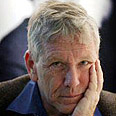
But this year, the competition is even more intriguing, as one of Oz's rivals is a Syrian poet.
Ali Ahmad Said Asbar, also known by the pseudonym Adonis, is considered Syria's greatest poet and was mentioned as a Literature Prize nominee last year as well.
Adonis, who chose to live in exile, made headlines across the world recently with an open letter to Bashar Assad, in which he urged the Syrian president to stop the bloody oppression commanded by his brother Maher Assad.
The poet's decision to join the Syrian people's battle for freedom has improved his chances in online betting sites, and he is now considered the favorite for this year's Literature Prize (1:4 on Ladbrokes), just ahead of Swedish poet Tomas Transtroemer and Hungary's Peter Nadas. Japan's Haruki Murakami has a good chance of winning as well (1:16).
It appears gamblers are not giving the Israeli novelist much of a chance of winning the prestigious prize: While Syria's Adonis tops the list, Oz is ranked in the middle (1:33), followed way behind by fellow Israeli writers A. B. Yehoshua and Shlomo Kalo (1:66).
But all speculations must be taken cautiously, as the prize committee in Stockholm is not revealing the names of the nominees and has yet to announce when the winner will be declared.
This year's Nobel season opens Monday with the Medicine Prize announcement in Sweden, followed by the Physics Prize on Tuesday. The Israeli scientific community hopes to see Prof. Yakir Aharonov, who was considered a leading nominee in 2010, pick up the prestigious award this year.
The winner of the Nobel Prize in chemistry will be announced this Wednesday, and on October 10 we'll know who won the prize in economic sciences. The identity of the literature prize laureate will be determined later on.
Peace Prize maye dominated by Arab Spring
The Norwegian Nobel Committee, which awards the Peace Prize, has confirmed a record 241 nominations for 2011, after honoring jailed Chinese dissident Liu Xiaobo last year.
Nobel watchers say that in a year so dominated by the Arab Spring uprising, which led to the overthrow of autocratic regimes in Tunisia, Egypt and Libya and rattled the ones in Syria, Yemen and Bahrain, an activist from that movement might get the call on October 7.
"The Arab spring is the favorite topic this year," Kristian Berg Harpviken, the head of the Peace Research Institute of Oslo, told AFP.
If an actor in the Arab Spring uprising is honored, Harpviken said his top pick would be Israa Abdel Fattah of Egypt and the April 6th youth Movement that she co-founded with Ahmed Maher in 2008.
The movement, which began on Facebook, "played a key role in maintaining the direction and non-violent character of the uprisings in Egypt," he said.
Also on Harpviken's shortlist was Google executive Wael Ghonim, "a principled non-violence activist" who was a central inspiration to the protests on Tahrir Square.
Tunisia's "Jasmine Revolution" could also inspire this year's award, in which case Tunisian blogger Lina Ben Mhenni, who chronicled the revolution in her country on the Internet, figures among the favorites.
Other names circulating are Afghan human rights activist Sima Samar, Russian human rights organization Memorial, Liberian activist Leymah Gbowee, Zimbabwean Prime Minister Morgan Tsvangirai, Germany's ex-Chancellor Helmut Kohl and the European Union.
Laureates receive 10 million Swedish kronor (about $1.48 million) which can be split between up to three winners per prize.
The Peace Prize will be handed out in Oslo on December 10, the anniversary of prize founder Alfred Nobel's death in 1896.
Other Nobel laureates will pick up their prizes in Stockholm on the same day.
Nine Israelis have won the prestigious prize so far: Shmuel Yosef Agnon (Literature); Menachem Begin, Yitzhak Rabin and Shimon Peres (Peace); Avram Hershko, Aaron Ciechanover and Ada Yonath (Chemistry); Robert Aumann and Daniel Kahneman (Economics).
AFP contributed to this report
- Follow Ynetnews on Facebook















